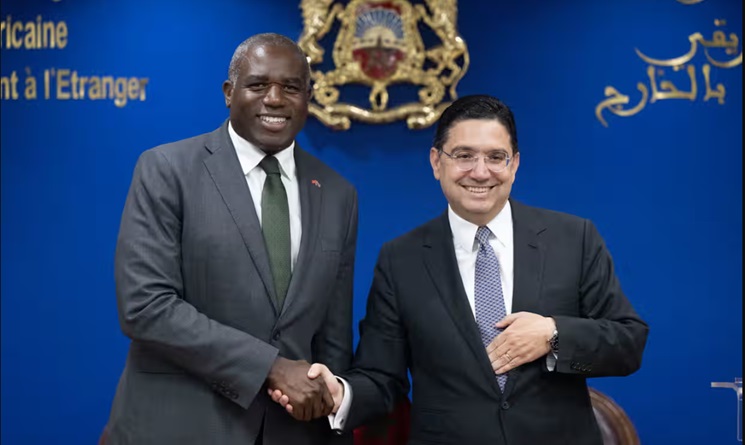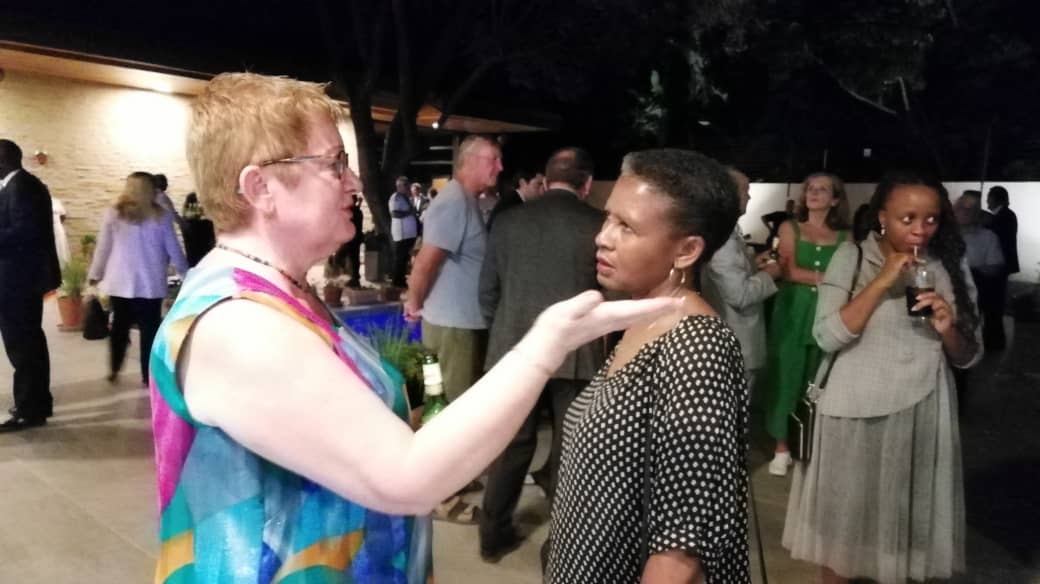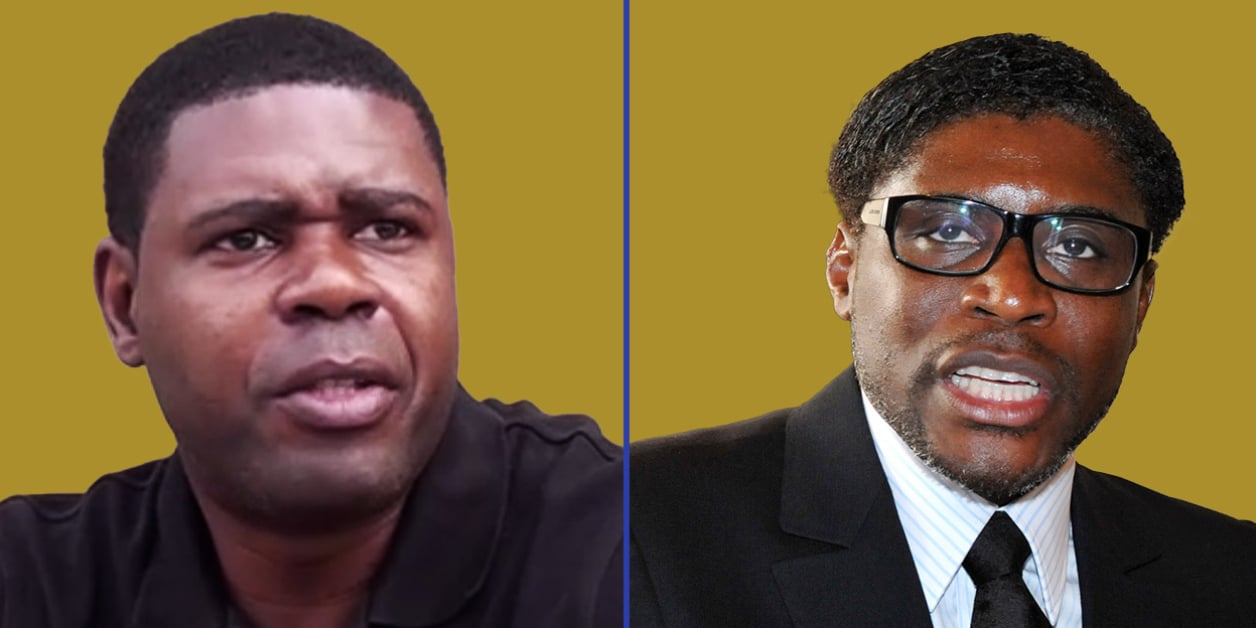
The Queen Mother, Mma Seingwaeng (left) arrives at Kgabutle in Moruleng, South Africa with Mohumagadi Mma Matshego during Heritage Day, 2019
Pako Lebanna
As Kathleen Nono Kgafela breathed her last at a private hospital in Gaborone on Sunday, January 16, a universally respected royal figure passed on.

Known by her royal name Mohumagadi Mma Seingwaeng, she was the Queen Mother of the Bakgatla ba ga Kgafela; wife of the late Linchwe II, and mother to current Bakgatla monarch Kgafela II.
The Bakgatla are a historically significant polity in Southern Africa; various Sotho-Tswana groups in Botswana, Lesotho, and South Africa claim common Bakgatla roots.
These include the founders of the Bapedi people; the Batlokwa group, and various Bakgatla clans of the Tswana (Bakgatla ba ga Kgafela, Mmanaana, Mosetlhe, Mocha, Mmakau).
Bakgatla ba ga Kgafela were among the Tswana groups displaced by the Boer Voortrekkers engaging in their “Great Trek” from the Cape into the interior. The Boers first established Natalia (Natal) around Zululand, and after an altercation with the Zulu leader Dingaan at the Weenen Massacre and the Battle of Blood River, they proceeded to set up the Orange Free State and the Transvaal.
In the Transvaal, the Boers found the Bakgatla settled in their lands around the Rustenburg area (Pilanesburg, named after Bakgatla ruler Pilane- the area now known for the famous Sun City resort and Pilanesburg National Park).
As the Boers instituted modern irrigated farming in the Transvaal, Bakgatla were forced to provide unpaid labour, until their leader Kgamanyane (Pilane’s son) disobeyed and was publicly flogged by Boer leader Paul Kruger.
As a consequence, in 1871 Kgamanyane then led half the tribe to Bechuanaland where Bakwena ruler Sechele I had stopped Boer encroachment at the Battle of Dimawe which stopped the Boers from claiming lands beyond the Marico River.
In present-day Botswana, the Bakgatla settled in Mochudi and what is now the Kgatleng District; annexed by Kgamanyane’s son Linchwe (pronounced Lentswe) from the Bakwena.
Linchwe I led Bakgatla regiments in fighting off Boer encroachment during the Anglo-Boer war of 1899 to 1902.
Linchwe I beget Kgafela, who never ruled as he died at a young age, and was thus never officially crowned as Kgafela II; the title now held by his great-grandson.
Isang Pilane held the fort as regent for his nephew, Kgafela’s son Molefi.
Under Isang Pilane, modern developments such as the Bakgatla National School and Deborah Retief Hospital were constructed in Mochudi in partnership with the Dutch Reformed Church, which had followed Bakgatla from the Transvaal into Bechuanaland.
Molefi then took over from his uncle Isang, and famously participated as part of the Black Southern African troop contingent offering support to the British Empire in World War II.
Back home, Molefi banished the Zion Christian Church (ZCC) from Kgatleng, including his own mother Seingwaeng, who fled to Lentswelemoriti in the Bobirwa sub-district of the then Ngwato reserve (now the Central District).
Molefi and his wife, the Queen Motlatsi Pilane’s son Linchwe Kgafela (Linchwe II) took over in 1963 and had a long reign until his 2007 passing on.
He brought his grandmother Seingwaeng back to Mochudi and lifted the ZCC ban in Kgatleng, inviting Bishop Barnabas Lekganyane and his band to his wedding as a conciliatory gesture.
It was through that marriage to Linchwe II that Kathleen Nono Kgafela (nee Motsepe) became a part of this royal family.
She herself was born royal in Hammanskraal near Pretoria, a part of the Bakgatla ba ga Mmakau royal family; an aunt to the famous Motsepe siblings (Patrice, Bridgette, and South Africa’s first lady Dr. Tshepo Motsepe Ramaphosa).
After her marriage to Linchwe II in Johannesburg in 1966, she moved to Botswana to assume duty as the Queen of the Kgatleng District, becoming Mohumagadi Mma Seingwaeng (the Queen, Seingwaeng’s mother).
Linchwe and Mma Seingwaeng had four children. The first two, a girl and boy, were named after Linchwe II’s grandparents, Molefi’s mother Seingwaeng and father Kgafela.
The younger two sons Bakgatle and Mmusi also had royal names – the youngest, the now cabinet Minister was named after Linchwe’s uncle, the former regent Mmusi Pilane.
Mma Seingwaeng played a supporting act to her husband as Linchwe worked on various community projects.
Linchwe supported the setting up of donor-funded empowerment projects such as Oodi Weavers.
Together with Sandy Grant, Linchwe turned Isang Pilane’s Bakgatla National School into the Phuthadikobo Museum; Grant collecting artefacts and anthropology information gathered amongst the Bakgatla by Isaac Schapera and Naomi Mitchinson, a solid collection and documentation of Bakgatla history.
Under Linchwe II Bakgatla revived Mephato (tribal regiments) and associated bogwera and bojale initiation as well as the signature Dikoma tribal singing.
As Thabo Mbeki has revealed, Linchwe was also active in supporting the ANC underground during the liberation struggle, including an escape route through the Kgatleng District and a hidden arms cache for use by Umkhonto WeSizwe cadres.
Later, Linchwe II won a court case in democratic South Africa at Mafikeng which acknowledged the seniority of the Botswana-based Bakgatla royalty and their authority to appoint and remove the Royal leaders at Moruleng/Pilanesburg near Rustenburg in the North West, RSA.
After Linchwe’s 2007 passing, his son Kgafela II took over in 2008. He also brought back tribal regiments.
Unfortunately, the first group Madibelankwe became notorious for the vigilante flogging of suspects without following the due legal process.
While Botswana customary law permits corporal punishment, a suspect has to be apprehended; given the choice of going to modern Roman-Dutch law courts or the Tswana customary kgotla system.
Some villagers prefer the customary court flogging to avoid prison sentences, but others opt for modern courts, and that choice has to be availed.
An official headman of arbitration tries the case in an official Kgotla, and the suspect should have the right to appeal to the Customary Court of Appeal. Females do not get flogged at all and only males aged under 40 can get lashed and only on the buttocks.
People complained that Kgafela’s Madibelankwe regiment was flouting these regulations; capturing and lashing youths, the elderly, and even pregnant women on their backs without trial.
Mascom telephony towers costing millions were also dislodged by the regiments.
After attempts by then Justice Minister Phandu Skelemani and Attorney General Athalia Molokomme to meditate and explain the law at Kgotla meetings proved futile, Kgafela II was arrested and charged.
He then fled to Moruleng in South Africa where he has lived since 2012.
Unfortunately, the passing on of his mother is now clouded by questions on whether he will come to Mochudi to lay the Queen Mother to rest.
But the Bakgatla, a proud custodian of Setswana culture, in attire, song, and dance can still be expected to give their Queen Mother a befitting send-off.
Robala Pila Mmaarona, Mohumagadi Mma Seingwaeng…Sedibelo, Kgabo!









